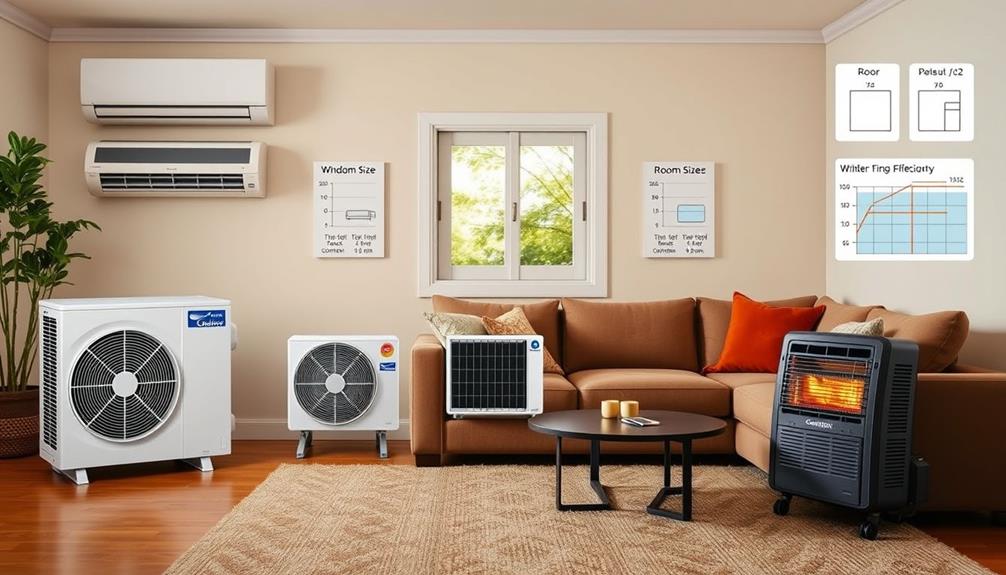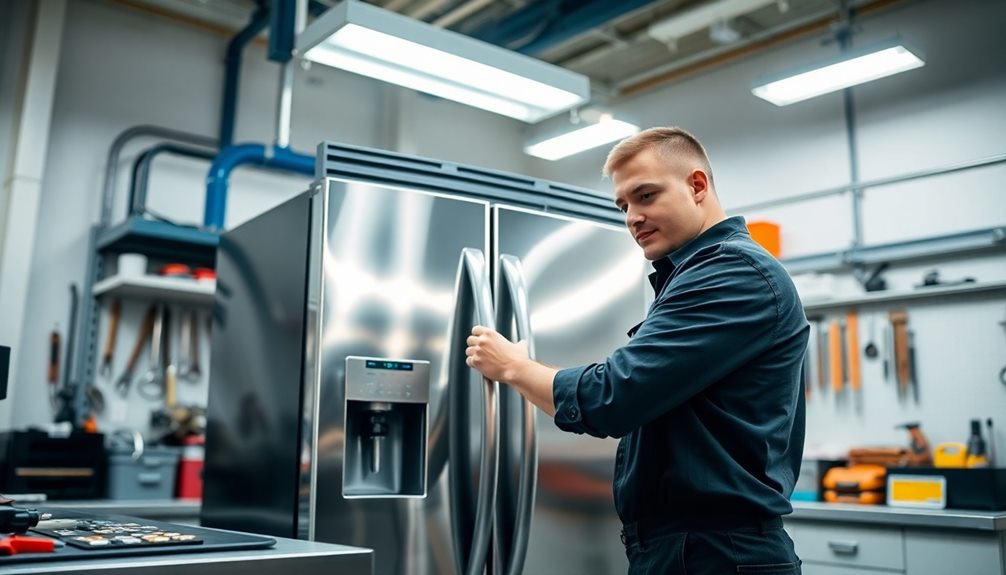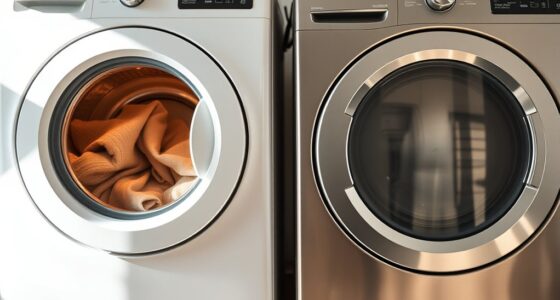Picking the correct **HVAC unit** for your **house size** is vital for coziness and effectiveness. Begin by analyzing your home’s square footage and insulation quality, as these aspects impact the system’s heating and cooling needs. Take into account your region’s climate; certain units perform best in mild weather, while others shine in colder or warmer conditions. **Appropriate sizing** is crucial; too big units waste energy, while too small ones may have trouble maintaining comfort. Also, don’t overlook **energy efficiency ratings** and available fuel options. If you’re curious to learn more about personalized choices, there are valuable insights for you to discover. Dive in to find out more reasons to upgrade your HVAC system now!
Key Takeaways
- Assess your home size and insulation to determine the appropriate HVAC system type and capacity for optimal efficiency.
- Use Manual J calculations to accurately size your HVAC unit, preventing issues from oversized or undersized systems.
- Consider energy efficiency ratings like SEER and AFUE to choose systems that will save on utility costs long-term.
- Factor in installation and maintenance costs in your budget to ensure a comprehensive understanding of total investment.
- Explore special features like smart thermostats and zoned systems for enhanced control and efficiency tailored to your home's needs.
Understanding HVAC System Types
When it comes to choosing an HVAC system, understanding the different types available is essential for making an informed decision. Each HVAC system is designed for specific home sizes and climates, so knowing your options can greatly enhance your home's energy efficiency.
Additionally, regular HVAC maintenance is important for optimizing performance and reducing energy bills. Traditional furnace and AC combos are the most common choice in the U.S. They work well for larger homes and offer flexibility with fuel options.
If you're in a moderate climate, consider air-source heat pumps, which provide both heating and cooling by reversing their operation. These systems excel in homes with mild winters and hot summers.
For homes without existing ductwork, ductless mini-splits are an excellent option. They allow for targeted heating and cooling in specific rooms or zones, giving you more control over energy usage.
If you're ready to invest upfront, geothermal heat pumps are highly efficient and eco-friendly. They're ideal for larger homes and require the installation of underground loops, making them a long-term energy-efficient solution.
Evaluating Price Considerations
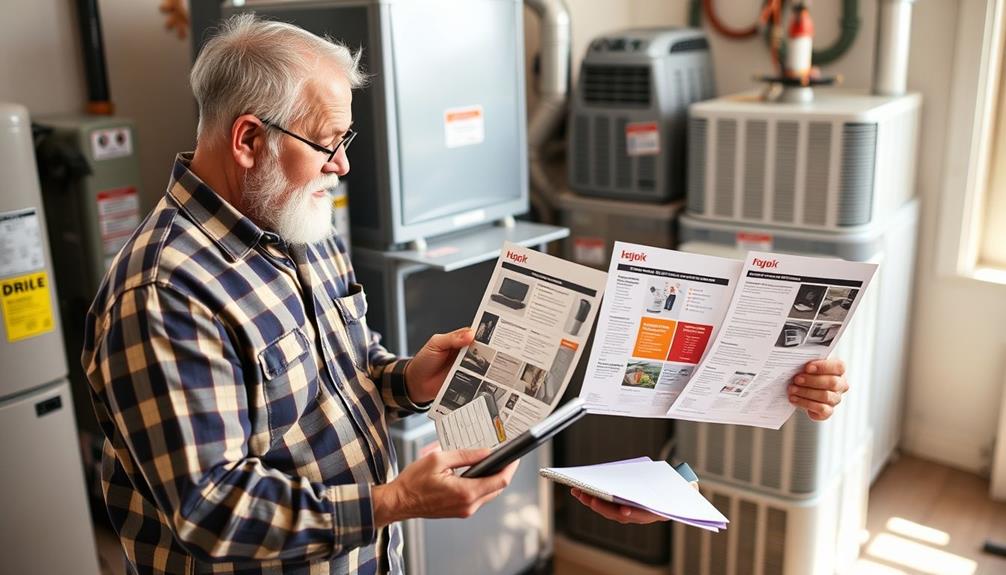
Choosing the right HVAC system involves careful evaluation of your budget. The cost of HVAC systems can vary greatly, often running into several thousand dollars based on brand, size, and installation complexity. It's important to factor in installation labor costs, as they can greatly impact your total investment.
Here's a quick overview of what to evaluate:
| Factor | Details |
|---|---|
| System Cost | Ranges from thousands, based on size/type |
| Installation Cost | Higher for complex systems |
| Energy Efficiency | Higher upfront cost, but long-term savings |
| Maintenance | More complex systems may require more care |
Consulting with HVAC installers can help you identify budget-friendly options without compromising comfort and efficiency. While higher efficiency units might cost more initially, they'll save you money on monthly utility bills in the long run. Balancing initial costs with long-term savings is key to making a wise investment. By evaluating these price considerations, you'll be better equipped to choose the right HVAC system for your home.
Importance of Proper Sizing
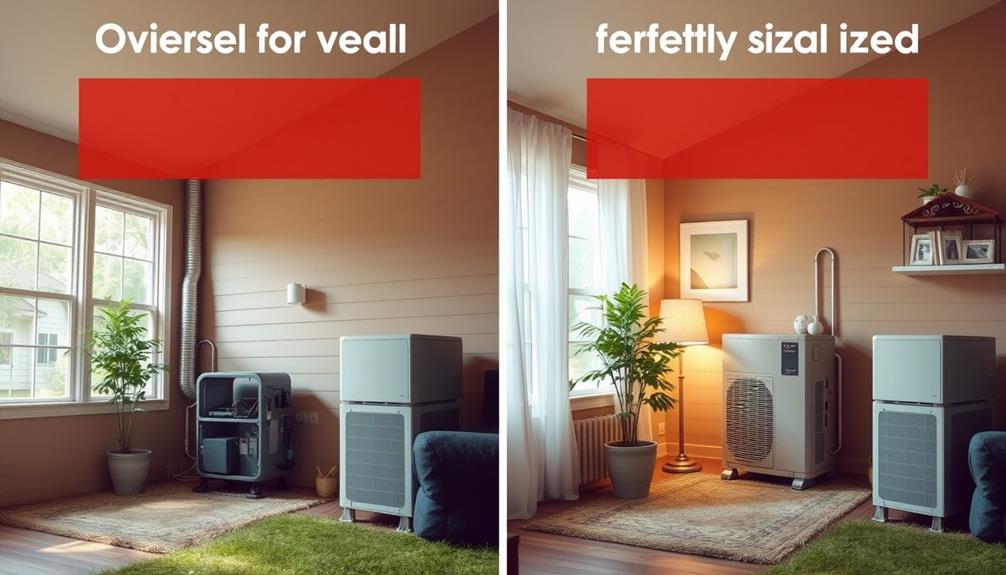
Properly sizing your HVAC system is essential for ideal performance and efficiency. If you choose an oversized unit, it can lead to frequent cycling, which increases energy costs and reduces overall efficiency. Conversely, an undersized unit may struggle to maintain your desired temperatures, leaving you uncomfortable.
To avoid these issues, you should consider using the Manual J calculation, which accounts for factors like square footage, insulation quality, and local climate conditions. Additionally, incorporating features like ceiling fans can enhance air circulation, promoting even temperature distribution in your home and further supporting your HVAC system's efficiency energy savings and comfort.
A good rule of thumb for sizing is that every 500 BTUs of capacity equals about 1 ton of cooling capability. For instance, a 3-ton unit can effectively handle around 36,000 BTUs per hour. When you guarantee proper sizing, your HVAC system can maintain consistent temperatures throughout your home, preventing those frustrating hot or cold spots.
Additionally, a correctly sized system not only boosts energy efficiency but also extends the unit's lifespan, leading to lower long-term operating costs. By prioritizing proper sizing, you're making a smart investment in your comfort and the environment, guaranteeing your home remains a pleasant retreat year-round.
Assessing Energy Efficiency
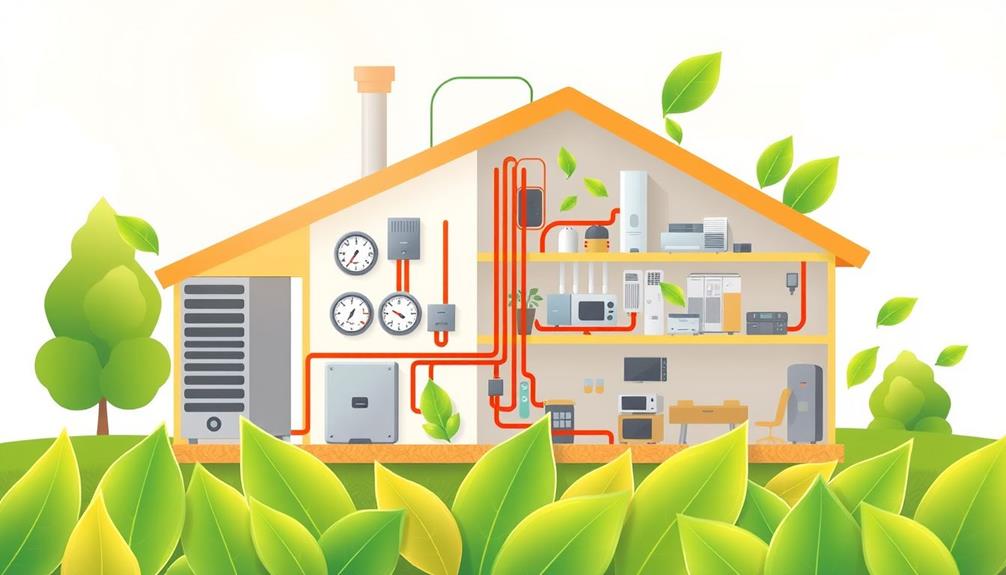
When you're selecting an HVAC system, understanding energy ratings is essential. Higher ratings, like SEER and AFUE, can lead to significant long-term cost savings on your utility bills.
Additionally, proper maintenance practices, such as regular inspections, can enhance the longevity and efficiency of your system, much like regular checks for clogging remedies help maintain toilet functionality.
Understanding Energy Ratings
Understanding energy ratings is essential for selecting an HVAC system that meets your needs while keeping utility costs down. Two pivotal ratings to evaluate are the Seasonal Energy Efficiency Ratio (SEER) and the Annual Fuel Utilization Efficiency (AFUE). A higher SEER means better cooling efficiency for air conditioning units, with a minimum standard of 14 SEER in the U.S. Similarly, an AFUE rating indicates how efficiently gas furnaces convert fuel into heat; for example, an AFUE of 90% signifies 90% efficiency.
To visualize this, evaluate the following table:
| Rating Type | Key Metric | Recommended Value |
|---|---|---|
| SEER | Cooling Efficiency | 14 or higher |
| AFUE | Heating Efficiency | 90% or higher |
| HSPF | Heat Pump Efficiency | 10 or higher |
Energy-efficient systems, such as those with the ENERGY STAR label, can save you over 20% on utility bills compared to non-certified models. Regular maintenance and correct sizing also enhance energy efficiency, ensuring you don't waste up to 30% of system performance. By understanding these ratings, you'll make a more informed choice for your HVAC system.
Long-Term Cost Savings
Investing in a high-efficiency HVAC system can lead to significant long-term cost savings. While the initial investment may be higher, you'll likely save between 20-50% on energy bills over the system's lifespan.
Additionally, utilizing renewable energy sources such as geothermal energy can further enhance your home's energy efficiency and sustainability.
Here's how you can maximize your energy efficiency and energy savings:
- Choose a high SEER rating: Opt for systems with a SEER rating of 15 or higher to minimize monthly utility bills.
- Select a high AFUE rating: Look for units with an AFUE rating above 90% for better heat conversion and lower heating costs.
- Ensure proper sizing: A properly sized HVAC system prevents energy waste. Oversizing can cause frequent cycling, while undersizing may lead to discomfort and higher operational costs.
- Use smart thermostats: Pair your energy-efficient system with a smart thermostat to optimize energy use, potentially saving an additional 10-15% on heating and cooling costs annually.
Maintenance and Upkeep Needs
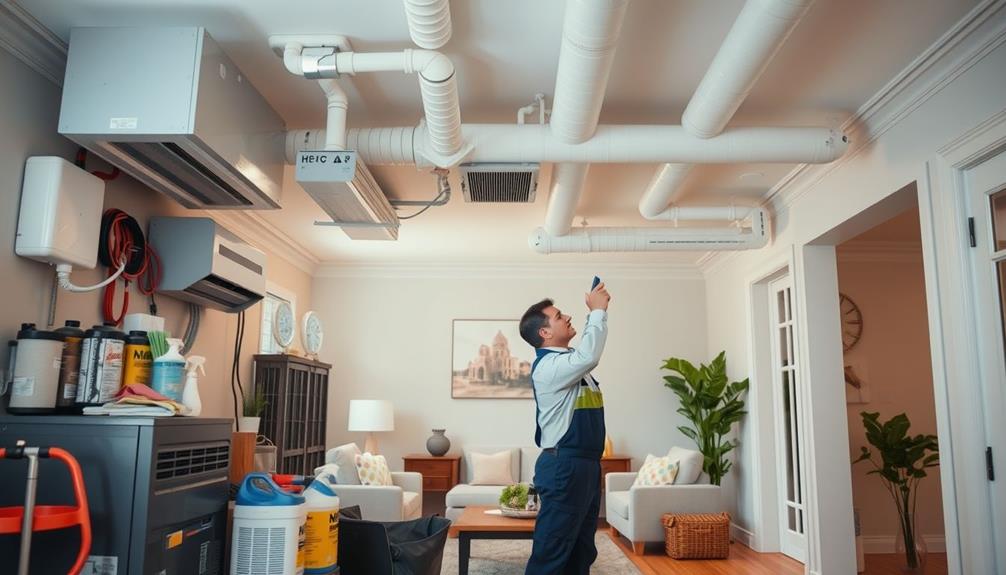
Maintaining your HVAC system is essential for its efficiency and longevity. Regular tasks like cleaning coils and replacing filters can prevent issues and save you money down the line.
Additionally, using ozone air purifiers can help improve indoor air quality, complementing your HVAC system's performance by eliminating allergens and odors.
Plus, scheduling annual service checks with professionals helps catch potential problems early, ensuring your system runs at its best.
Annual Service Importance
Regular annual service is essential for keeping your HVAC system running smoothly and efficiently. Not only does it help maintain HVAC system efficiency, but it also guarantees compliance with warranty requirements.
By scheduling regular maintenance, you can prevent minor issues from developing into costly repairs. This is especially important for heat pumps, as common issues like refrigerant leaks or electrical failures can be avoided with proper upkeep.
Here are four key benefits of annual service:
- Enhanced Efficiency: Proper maintenance can improve your system's efficiency by up to 15%, leading to lower energy bills.
- Prolonged Lifespan: Regular checks contribute to the longevity of your HVAC system, saving you from premature replacements.
- Optimal Performance: Routine inspections by certified professionals guarantee that all components are functioning correctly, enhancing both heating and cooling effectiveness.
- Preventative Care: Identifying and resolving potential issues early on can prevent bigger problems down the line.
To maximize your investment, keep outdoor units free from debris and guarantee vents are unobstructed.
Common Maintenance Tasks
Keeping your HVAC system in top shape relies on a few common maintenance tasks that you can easily manage. One of the most important tasks you should perform is checking and replacing air filters monthly. Dirty filters restrict airflow and can notably impair your system's performance, leading to higher energy bills and poor indoor air quality.
Additionally, having a reliable garage door opener enhances your home security, which is equally important in maintaining a safe and comfortable environment.
Additionally, you should clean the coils regularly to help maintain efficiency. It's also vital to verify that outdoor units are free of debris, like leaves or dirt, which can block airflow and affect performance.
Keeping vents open and unobstructed is another simple yet essential task to prevent duct damage and allow proper airflow throughout your home.
For ductless systems, while they require less ductwork maintenance, you still need to perform routine checks on indoor units and filters.
Remember that annual service is necessary not just for performance but also to maintain manufacturer warranties. By staying on top of these regular maintenance tasks, you can optimize your HVAC system's efficiency and potentially extend its lifespan.
Professional Maintenance Benefits
While you might be tempted to handle HVAC maintenance yourself, enlisting a professional can greatly enhance your system's performance and longevity.
Regular professional maintenance guarantees peak efficiency, identifying potential issues before they escalate and prolonging your HVAC system's lifespan.
Additionally, just as with budget-friendly vacuum cleaners, a small investment in professional upkeep can yield significant long-term savings.
Here are four key benefits of having a professional take care of your system:
- Thorough Cleaning: Professionals clean coils and replace filters, boosting your unit's performance and reducing energy costs.
- Expert Inspections: They check refrigerant levels and guarantee everything's functioning properly, preventing costly breakdowns.
- Airflow Maintenance: Professionals emphasize keeping outdoor units free of debris and guaranteeing vents are unobstructed, maintaining proper airflow and minimizing strain on the system.
- Warranty Compliance: Many HVAC warranties require annual professional maintenance to remain valid, safeguarding your investment.
Even ductless systems, which need less ductwork, benefit from professional inspections for peak airflow and efficiency.
By prioritizing professional maintenance, you're guaranteeing your HVAC system operates at its best, ultimately saving you money and improving comfort in your home.
Don't overlook the importance of expert care!
Special Features to Consider
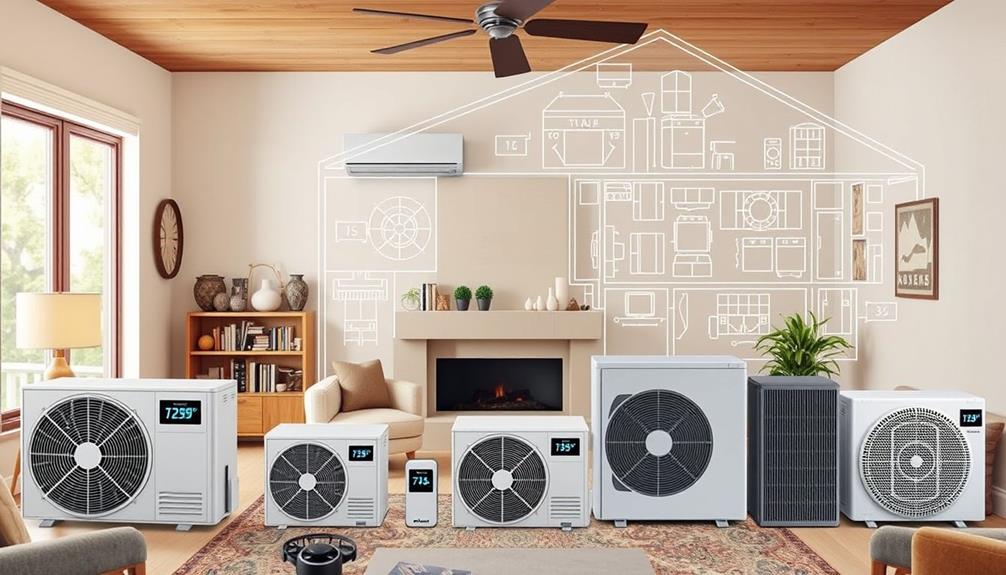
What special features should you prioritize when selecting an HVAC system? Start by looking for energy efficiency features. Systems with secondary heat exchangers can notably enhance how effectively your HVAC utilizes heat, reducing energy consumption and costs.
Additionally, consider investing in smart thermostats. These devices allow you to control your system remotely, optimizing energy use based on when you're home or away, which can lead to considerable savings. For an even more efficient setup, explore options like best HVAC companies that offer extensive services and energy-efficient systems.
Another important option is a zoned HVAC system. This feature lets you customize temperatures in different areas of your home, improving comfort and reducing energy waste in unoccupied spaces. If you often find certain rooms too hot or too cold, a zoning system can be a game-changer.
You might also want to explore modulating furnaces. These adjust their heating output based on demand, providing consistent warmth while maintaining high energy efficiency.
Fuel Source Options

When choosing an HVAC system, the fuel source you select plays an essential role in both installation costs and energy efficiency. Understanding your options can help you make an informed decision. Common fuel source options include:
- Natural Gas: Often the most cost-effective choice, natural gas systems typically offer lower operating costs. They provide a stable energy source, similar to how diversification of retirement portfolios reduces risk exposure in financial investments.
- Propane: A viable alternative where natural gas isn't available; it can be more expensive than natural gas but still efficient.
- Heating Oil: Generally associated with higher costs and less efficiency compared to gas; it may be suitable in some regions.
- Electricity: While convenient, electric systems often have higher operating costs, especially in areas with high electricity prices.
The efficiency of your HVAC system can greatly vary based on the fuel source. For instance, if you're considering switching from heating oil to natural gas, you may face higher installation costs initially, but the long-term energy savings can be substantial.
It's wise to consult with HVAC providers to assess the best fuel source options based on local availability, cost considerations, and system compatibility for your home.
Climate Impact on Sizing
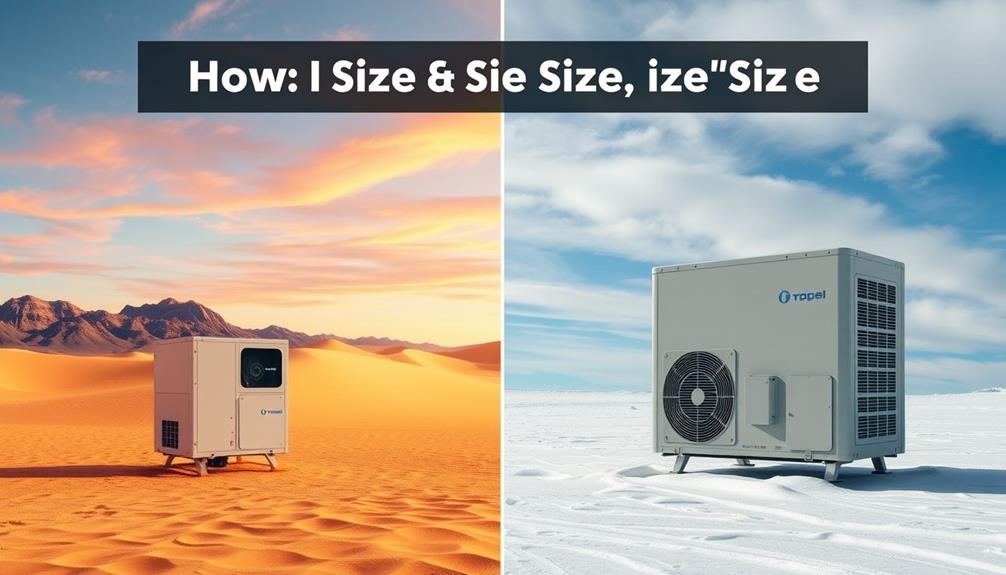
Understanding the climate in your area is crucial for sizing your HVAC system correctly. The local climate greatly impacts your heating and cooling needs, so it's essential to take temperature extremes into account.
In hotter regions, your system must have a higher cooling capacity, which often means selecting air conditioning units with elevated Seasonal Energy Efficiency Ratio (SEER) ratings. This guarantees your home stays comfortable during sweltering summer months.
On the flip side, if you live in a colder climate, you'll need a heating system with a high Heating Seasonal Performance Factor (HSPF) rating. This aids in managing heating loads efficiently during winter.
Additionally, humidity levels can affect HVAC performance; your system must be sized not only for temperature but also to handle moisture effectively, preventing discomfort and potential mold growth.
Altitude is another factor that influences air pressure and density, which might require adjustments in your system sizing.
Consulting HVAC Professionals

Getting the right HVAC system for your home goes beyond just understanding climate impacts; it involves consulting HVAC professionals who can guide you through the sizing process.
These experts are essential for accurate calculations, using methods like Manual J to assess your home's unique needs.
Here's why you should engage with them:
- Tailored Recommendations: Professionals consider local climate conditions to suggest systems that efficiently manage heating and cooling.
- Ductwork Assessment: They evaluate existing ductwork to identify any necessary improvements for better air distribution and comfort.
- Fuel Source Options: Consulting HVAC professionals allows you to explore different fuel sources, affecting both installation costs and energy efficiency.
- Energy Efficiency Ratings: Certified technicians guarantee your selected system meets important energy efficiency ratings, like SEER and AFUE, for peak performance.
Frequently Asked Questions
How to Size an HVAC System for a House?
To size an HVAC system for your house, calculate your BTU needs based on square footage, insulation, and windows. Avoid oversizing or undersizing; consult professionals to guarantee maximum efficiency and comfort in your living space.
How Do I Know What Size Air Conditioner I Need for My Whole House?
Did you know that you need about 20 BTUs per square foot of living space? To find the right size air conditioner for your whole house, assess your square footage, insulation, and local climate conditions.
How Do I Choose an HVAC System for My Home?
To choose an HVAC system for your home, start by evaluating your needs. Consider factors like energy efficiency, cost, and your home's layout. Consulting professionals will help you find the best fit for your requirements.
What Is the Rule of Thumb for Residential HVAC Sizing?
Think of your home as a cozy blanket. For residential HVAC sizing, you'll need about 20 BTUs per square foot. Adjust for insulation, climate, and unique home features to guarantee a perfect fit.
Conclusion
So, you've learned how to pick the right HVAC system for your home, but remember, choosing just the right size is as essential as picking the right outfit for a first date. You wouldn't wear a parka in July, right? Just like you wouldn't want your HVAC to blow hot air all summer long. In the end, consult a professional, because nothing says "I care about my comfort" quite like a system that fits just right—unlike those skinny jeans you're still holding onto!
